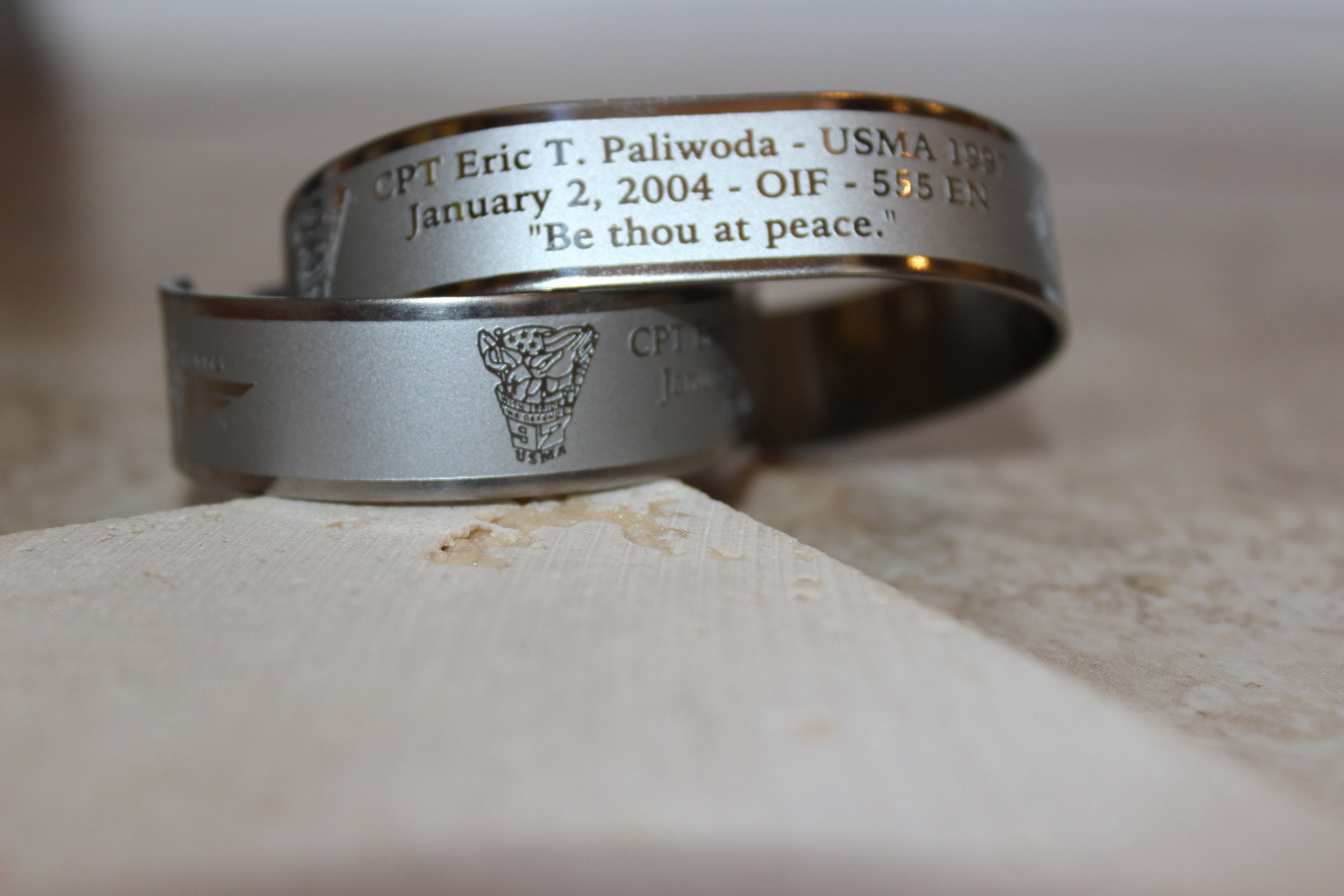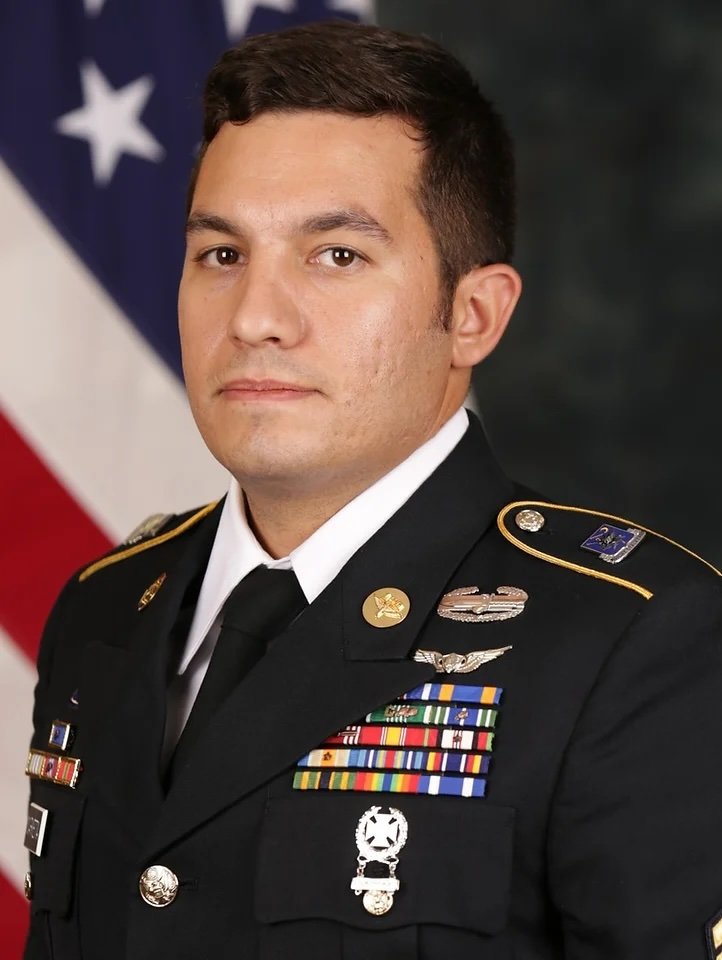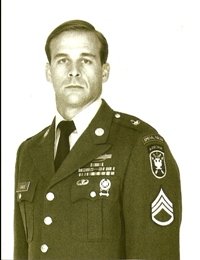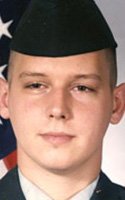CPT Eric T. Paliwoda (USMA '97)
Army Capt. Eric T. Paliwoda, 28, Goodyear, AZ was killed 02 January 2004 when his command post came under attack in Balad, Iraq. He was assigned to 4th Engineer Battalion, 3rd Brigade Combat Team, 4th Infantry Division (Mechanized) in Fort Carson, CO.
Army Capt. Eric Thomas Paliwoda, who grew up in Farmington and West Hartford, died Jan. 2, 2004 in a mortar attack on his base at Balad, Iraq. He commanded Company B of the 4th Engineer Battalion, 3rd Brigade Combat Team, 4th Infantry Division. He was 28 years old.
Growing up in Farmington and West Hartford, Eric Thomas Paliwoda distinguished himself as a student, an athlete and a natural leader.
So when colleges came calling for the 6-foot-6 forward on Conard High School's basketball team, it was the U.S. Military Academy at West Point that won his heart. An Army career followed, and that took Paliwoda, 28, to Iraq.
The friendly captain known as “Big E'' died there Friday of wounds suffered when insurgents fired mortars into his base at Balad, 50 miles northwest of Baghdad.
“He was a truly patriotic, all-American boy, very personable, tall, athletic, well-liked,'' said John Perotti, a Unionville neighbor whose two sons grew up with Paliwoda. “You thought someday he might be a U.S. senator.''
Paliwoda commanded Company B of the 4th Engineer Battalion, 3rd Brigade Combat Team, 4th Infantry Division. He was due home in April and intended to marry his fiancee, Wendy Rosen, in June. After the wedding, he planned to earn a master's degree and return to West Point to teach.
“He was very excited,'' said his mother, Mary Paliwoda, of Goodyear and Sedona, Ariz. “He'd be a wonderful teacher; he had a very commanding presence.''
Those leadership qualities showed themselves early. When someone was needed to lead Irving A. Robbins Middle School students in singing “Happy Birthday,'' Paliwoda was the one who stepped forward, recalled teacher Ted Lindquist.
At Conard, Paliwoda continued to excel. Although captain of the varsity basketball team, he made time for younger teammates, playing one-on-one with freshmen during his senior year.
He was a good athlete, distinguished by his work ethic. “In the summers, the rest of us would be fooling around and he would be out on the basketball court,'' said teammate and friend Nicholas Sergi. “He basically carried our team for a couple of years.''
And when the coach needed him to take on a role that removed him from the limelight, Paliwoda did it because it was for the good of the team, recalled Conard basketball coach John Benyei.
“He was one of the hardest working and most dedicated kids we ever had,'' Benyei said. “He was the sort of kid that coaches talk about years after they leave because you know they are going to be successful.''
Not surprisingly, colleges courted him. “He was wildly sought after as a basketball player,'' said Mary Hourdequin, his guidance counselor at Conard. “He was such an outstanding young man.''
Paliwoda chose the U.S. Military Academy because it seemed the best fit for his personality, Hourdequin said. ``It was really what he wanted,'' she said. “He was the type of student they were looking for. He had tremendous self-discipline.''
In a 1992 interview with The Courant, shortly after making an oral commitment to play basketball at West Point, Paliwoda said basketball played a minimal role in his decision.
“It came down to education,'' he said at the time. “You can't compete with a West Point education.''
Paliwoda played basketball his first year at West Point, then switched to football and played tight end until he injured his shoulder. During his last two years, he was a hammer thrower on the track team, winning a league championship.
His outgoing personality made him popular with other cadets and faculty at the military academy, said Col. W. Chris King, a West Point professor who was Paliwoda's adviser. After completing his mandatory five-year commitment to serve, Paliwoda chose to stay in the Army.
“Eric really liked being an officer in the U.S. Army,'' King said. “He loved [his] troops, and loved taking care of the young men and women he was responsible for.''
Paliwoda's West Point roommate, Capt. Jeffrey Csoka, said Paliwoda was with those men and women when mortar rounds began falling on his command post, fatally wounding him.
“He liked working with soldiers,'' said Csoka, who married Paliwoda's sister, Allison. “He was a great leader.''
In an effort to better understand Iraq and its people, Paliwoda asked his parents to mail him books about Iraqi culture, his mother said. During the Muslim holy month of Ramadan, Paliwoda's unit lifted a curfew and restricted its patrols to major roads as a show of respect.
As a company commander, Paliwoda negotiated with Iraqi tribal leaders. “At one point he said he felt like the mayor of the town,'' his mother said.
Many of Paliwoda's friends called West Point after learning of his death and have told King they plan to return to the academy for his funeral and burial.
“He's coming back to West Point,'' King said.
Proceeds from the CPT Eric T. Paliwoda bracelet will be donated to the American Fallen Warrior Memorial Foundation in his memory.
Army Capt. Eric T. Paliwoda, 28, Goodyear, AZ was killed 02 January 2004 when his command post came under attack in Balad, Iraq. He was assigned to 4th Engineer Battalion, 3rd Brigade Combat Team, 4th Infantry Division (Mechanized) in Fort Carson, CO.
Army Capt. Eric Thomas Paliwoda, who grew up in Farmington and West Hartford, died Jan. 2, 2004 in a mortar attack on his base at Balad, Iraq. He commanded Company B of the 4th Engineer Battalion, 3rd Brigade Combat Team, 4th Infantry Division. He was 28 years old.
Growing up in Farmington and West Hartford, Eric Thomas Paliwoda distinguished himself as a student, an athlete and a natural leader.
So when colleges came calling for the 6-foot-6 forward on Conard High School's basketball team, it was the U.S. Military Academy at West Point that won his heart. An Army career followed, and that took Paliwoda, 28, to Iraq.
The friendly captain known as “Big E'' died there Friday of wounds suffered when insurgents fired mortars into his base at Balad, 50 miles northwest of Baghdad.
“He was a truly patriotic, all-American boy, very personable, tall, athletic, well-liked,'' said John Perotti, a Unionville neighbor whose two sons grew up with Paliwoda. “You thought someday he might be a U.S. senator.''
Paliwoda commanded Company B of the 4th Engineer Battalion, 3rd Brigade Combat Team, 4th Infantry Division. He was due home in April and intended to marry his fiancee, Wendy Rosen, in June. After the wedding, he planned to earn a master's degree and return to West Point to teach.
“He was very excited,'' said his mother, Mary Paliwoda, of Goodyear and Sedona, Ariz. “He'd be a wonderful teacher; he had a very commanding presence.''
Those leadership qualities showed themselves early. When someone was needed to lead Irving A. Robbins Middle School students in singing “Happy Birthday,'' Paliwoda was the one who stepped forward, recalled teacher Ted Lindquist.
At Conard, Paliwoda continued to excel. Although captain of the varsity basketball team, he made time for younger teammates, playing one-on-one with freshmen during his senior year.
He was a good athlete, distinguished by his work ethic. “In the summers, the rest of us would be fooling around and he would be out on the basketball court,'' said teammate and friend Nicholas Sergi. “He basically carried our team for a couple of years.''
And when the coach needed him to take on a role that removed him from the limelight, Paliwoda did it because it was for the good of the team, recalled Conard basketball coach John Benyei.
“He was one of the hardest working and most dedicated kids we ever had,'' Benyei said. “He was the sort of kid that coaches talk about years after they leave because you know they are going to be successful.''
Not surprisingly, colleges courted him. “He was wildly sought after as a basketball player,'' said Mary Hourdequin, his guidance counselor at Conard. “He was such an outstanding young man.''
Paliwoda chose the U.S. Military Academy because it seemed the best fit for his personality, Hourdequin said. ``It was really what he wanted,'' she said. “He was the type of student they were looking for. He had tremendous self-discipline.''
In a 1992 interview with The Courant, shortly after making an oral commitment to play basketball at West Point, Paliwoda said basketball played a minimal role in his decision.
“It came down to education,'' he said at the time. “You can't compete with a West Point education.''
Paliwoda played basketball his first year at West Point, then switched to football and played tight end until he injured his shoulder. During his last two years, he was a hammer thrower on the track team, winning a league championship.
His outgoing personality made him popular with other cadets and faculty at the military academy, said Col. W. Chris King, a West Point professor who was Paliwoda's adviser. After completing his mandatory five-year commitment to serve, Paliwoda chose to stay in the Army.
“Eric really liked being an officer in the U.S. Army,'' King said. “He loved [his] troops, and loved taking care of the young men and women he was responsible for.''
Paliwoda's West Point roommate, Capt. Jeffrey Csoka, said Paliwoda was with those men and women when mortar rounds began falling on his command post, fatally wounding him.
“He liked working with soldiers,'' said Csoka, who married Paliwoda's sister, Allison. “He was a great leader.''
In an effort to better understand Iraq and its people, Paliwoda asked his parents to mail him books about Iraqi culture, his mother said. During the Muslim holy month of Ramadan, Paliwoda's unit lifted a curfew and restricted its patrols to major roads as a show of respect.
As a company commander, Paliwoda negotiated with Iraqi tribal leaders. “At one point he said he felt like the mayor of the town,'' his mother said.
Many of Paliwoda's friends called West Point after learning of his death and have told King they plan to return to the academy for his funeral and burial.
“He's coming back to West Point,'' King said.
Proceeds from the CPT Eric T. Paliwoda bracelet will be donated to the American Fallen Warrior Memorial Foundation in his memory.
Army Capt. Eric T. Paliwoda, 28, Goodyear, AZ was killed 02 January 2004 when his command post came under attack in Balad, Iraq. He was assigned to 4th Engineer Battalion, 3rd Brigade Combat Team, 4th Infantry Division (Mechanized) in Fort Carson, CO.
Army Capt. Eric Thomas Paliwoda, who grew up in Farmington and West Hartford, died Jan. 2, 2004 in a mortar attack on his base at Balad, Iraq. He commanded Company B of the 4th Engineer Battalion, 3rd Brigade Combat Team, 4th Infantry Division. He was 28 years old.
Growing up in Farmington and West Hartford, Eric Thomas Paliwoda distinguished himself as a student, an athlete and a natural leader.
So when colleges came calling for the 6-foot-6 forward on Conard High School's basketball team, it was the U.S. Military Academy at West Point that won his heart. An Army career followed, and that took Paliwoda, 28, to Iraq.
The friendly captain known as “Big E'' died there Friday of wounds suffered when insurgents fired mortars into his base at Balad, 50 miles northwest of Baghdad.
“He was a truly patriotic, all-American boy, very personable, tall, athletic, well-liked,'' said John Perotti, a Unionville neighbor whose two sons grew up with Paliwoda. “You thought someday he might be a U.S. senator.''
Paliwoda commanded Company B of the 4th Engineer Battalion, 3rd Brigade Combat Team, 4th Infantry Division. He was due home in April and intended to marry his fiancee, Wendy Rosen, in June. After the wedding, he planned to earn a master's degree and return to West Point to teach.
“He was very excited,'' said his mother, Mary Paliwoda, of Goodyear and Sedona, Ariz. “He'd be a wonderful teacher; he had a very commanding presence.''
Those leadership qualities showed themselves early. When someone was needed to lead Irving A. Robbins Middle School students in singing “Happy Birthday,'' Paliwoda was the one who stepped forward, recalled teacher Ted Lindquist.
At Conard, Paliwoda continued to excel. Although captain of the varsity basketball team, he made time for younger teammates, playing one-on-one with freshmen during his senior year.
He was a good athlete, distinguished by his work ethic. “In the summers, the rest of us would be fooling around and he would be out on the basketball court,'' said teammate and friend Nicholas Sergi. “He basically carried our team for a couple of years.''
And when the coach needed him to take on a role that removed him from the limelight, Paliwoda did it because it was for the good of the team, recalled Conard basketball coach John Benyei.
“He was one of the hardest working and most dedicated kids we ever had,'' Benyei said. “He was the sort of kid that coaches talk about years after they leave because you know they are going to be successful.''
Not surprisingly, colleges courted him. “He was wildly sought after as a basketball player,'' said Mary Hourdequin, his guidance counselor at Conard. “He was such an outstanding young man.''
Paliwoda chose the U.S. Military Academy because it seemed the best fit for his personality, Hourdequin said. ``It was really what he wanted,'' she said. “He was the type of student they were looking for. He had tremendous self-discipline.''
In a 1992 interview with The Courant, shortly after making an oral commitment to play basketball at West Point, Paliwoda said basketball played a minimal role in his decision.
“It came down to education,'' he said at the time. “You can't compete with a West Point education.''
Paliwoda played basketball his first year at West Point, then switched to football and played tight end until he injured his shoulder. During his last two years, he was a hammer thrower on the track team, winning a league championship.
His outgoing personality made him popular with other cadets and faculty at the military academy, said Col. W. Chris King, a West Point professor who was Paliwoda's adviser. After completing his mandatory five-year commitment to serve, Paliwoda chose to stay in the Army.
“Eric really liked being an officer in the U.S. Army,'' King said. “He loved [his] troops, and loved taking care of the young men and women he was responsible for.''
Paliwoda's West Point roommate, Capt. Jeffrey Csoka, said Paliwoda was with those men and women when mortar rounds began falling on his command post, fatally wounding him.
“He liked working with soldiers,'' said Csoka, who married Paliwoda's sister, Allison. “He was a great leader.''
In an effort to better understand Iraq and its people, Paliwoda asked his parents to mail him books about Iraqi culture, his mother said. During the Muslim holy month of Ramadan, Paliwoda's unit lifted a curfew and restricted its patrols to major roads as a show of respect.
As a company commander, Paliwoda negotiated with Iraqi tribal leaders. “At one point he said he felt like the mayor of the town,'' his mother said.
Many of Paliwoda's friends called West Point after learning of his death and have told King they plan to return to the academy for his funeral and burial.
“He's coming back to West Point,'' King said.
Proceeds from the CPT Eric T. Paliwoda bracelet will be donated to the American Fallen Warrior Memorial Foundation in his memory.












